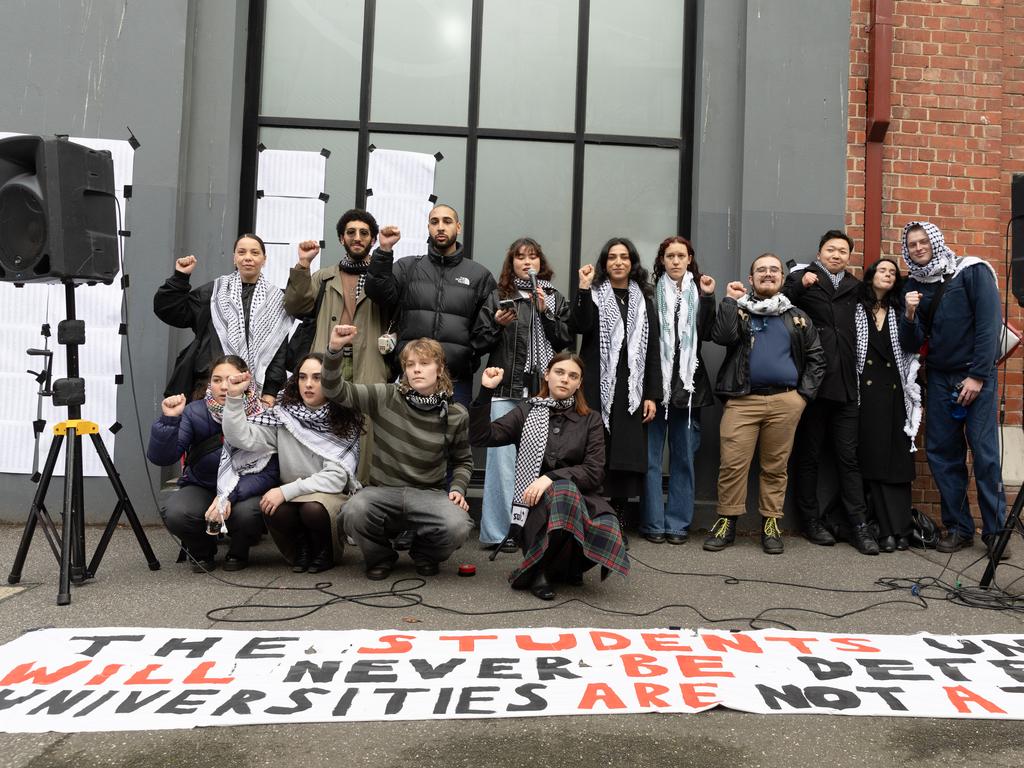
That the conduct breached the university’s regulations is uncontested. Wearing any item of clothing over the prescribed academic gown is specifically prohibited; so is bringing into the event “poles, signs, flags or similar”. As for shouting slogans, waving flags and berating the public, participants are warned that they may be removed for “being disruptive, or adversely affecting the enjoyment of the event by others”.
Those regulations are not meant to be taken lightly. Graduation, the university notes, is its “signature event”, whose “rituals and traditions” participants must respect. There are, as a result, security guards, tasked with inspecting bags, confiscating prohibited items and ensuring the ceremony unfolds smoothly.
But neither the senior academics conducting the proceedings nor the security guards took any action whatsoever to prevent or quell the disruption. Nor did the university, which soon learnt that the disruption had caused significant distress, issue a public apology to those who had attended the event – as it would unquestionably, and quite rightly, have done had the conduct offended, say, Indigenous Australians.
Now Joanne Ligouris, the university’s registrar, has replied to a number of written complaints in terms that are manifestly inadequate.
Thus, while acknowledging that the protesters cavalierly flouted the regulations, Ligouris claims the university had to abide by its “legal obligations with respect to freedom of speech and expression”. It should, however, be blindingly obvious that a graduation ceremony is not Speakers’ Corner in Hyde Park: the university has no obligation, legal or otherwise, to stand mutely by as protesters subject graduands and their families to rants and tirades.
And it should be every bit as obvious that – far from being required to tolerate the abuse of its proceedings – it was the university’s obligation to make sure the occasion was (as the university’s regulations put it) a “celebration” graduands would remember with pride and joy.
Ligouris is on even weaker ground in contending that the university’s refusal to intervene served to “de-escalate” a situation that could have “become disruptive”. On the contrary, it simply permitted the disruption to occur and persist. And instead of deterring – or “de-escalating” – future protests, the university’s capitulation unequivocally signalled that disruption will succeed.
Unfortunately, the University of Melbourne is not alone in its determination to expunge the last vapours of civility from Australian life. A slew of our leading cultural institutions – including, most recently, the Melbourne Symphony Orchestra – no longer believe they are there to serve the public.
Rather, the public is there to serve their employees, who, aflame with self-righteousness, view the institution as a platform from which to vent adolescent rages upon unsuspecting spectators. But the costs of making every venue into a soapbox go well beyond the pain inflicted on captive audiences. In effect, few poisons can wreak more harm than the pervasive politicisation of institutions that have traditionally remained above the fray.
Aristotle thought about those risks, more than 2000 years ago, in terms of the fragility of “civic friendship”. For a polis to flourish, spaces were required where “people who do not know one another” – and whose opinions might differ sharply – would, however fleetingly, peaceably interact, laying the groundwork for some degree of “homonia” or concord.
Centuries later, Cicero, writing as the Roman republic threatened to unravel, stressed the need for those spaces to become places: that is, robust institutions in which the virtues of respectful sociability could be inculcated by a “regularised, stable and sustained coming together”.
And many centuries later again, Alexis de Tocqueville, in explaining to sceptical French readers why the American democracy was likely to endure, suggested the answer lay at least partly in ubiquitous civic activity, covering everything from religion to music, theatre and the arts.
Yes, said Tocqueville, democratic individuals participated in those activities to further their personal inclinations. But repeated interaction with their fellow citizens transformed their habitual behaviour. Induced, without realising it, into establishing social ties with people quite unlike themselves, “feelings and ideas are renewed, the heart expands, and the human spirit develops”.
But no one more cogently analysed that process’s importance than pioneering German sociologist Georg Simmel (1858-1918). What mattered, wrote Simmel in his analysis of how modern societies could hang together, was not merely the sheer number of activities in which people were, in one way or another, involved. It was the way those involvements made society into a complex, overlapping mosaic of interactions.
The people with whom one socialised at weekly concerts were, for example, different from those with whom one regularly shared a stand at the football. And because those events were apolitical, music-loving social democrats happily rubbed shoulders with music-loving conservatives, in a context focused not on what divided them but on what they had in common – just as Christians would find themselves rubbing shoulders with Jews.
Excluding the divisive political cleavages from large areas of social life therefore created the “safe spaces” in which society could weave its intricate weft and warp. Gag rules – “no politics!” – seemed repressive. But far from choking social life, the gags allowed it to breathe, imperceptibly cultivating the mutual respect that underpinned what Tocqueville called democracy’s “habits of the heart”.

Nothing, Simmel argued, could make people whose views were wildly at odds into bosom friends; but crisscrossing entanglements made it less likely that they would become deadly enemies. And sure enough, when those safe spaces disappeared in continental Europe’s first 20th century decades, social bonds shattered, with devastating consequences – as now seems to have happened in the United States.
That is why Gabriel Almond and Sidney Verba, in their path-breaking book, The Civic Culture (1963), concluded that stable democracies were ones in which “there is political activity, but it is held in check”: that is, where emotionally charged political commitments were corralled into the political process, allowing them to be addressed without degenerating into mob rule. And it is also why our current course – where every activity is soaked in politics at its most divisive – is utterly disastrous.
Of course, none of that matters to the lunatic fringe. They relish the brutalisation of politics; that many Jews now feel uncomfortable or even unsafe at events they have long patronised is, in their eyes, a measure of success.
Nor does it matter to the cultural institutions. Being so heavily subsidised by taxpayers, the goodwill of ordinary audiences scarcely counts – though, for all their radical-chic posturing, they blanche when exasperated philanthropists finally, and quite rightly, pull the plug.
It should, however, matter to the universities, which ought to realise what is at stake. Instead, with Mark Scott refusing to enforce Sydney University’s own code of academic conduct, our two oldest universities have decisively proven, in the space of only a few days, that their leadership is morally and intellectually bankrupt. Could there be a surer sign of the sorry state we’re in?






Earlier this month, the University of Melbourne’s graduation ceremony was disrupted when a handful of students donned keffiyehs, shouted slogans and repeatedly waved a Palestinian flag.